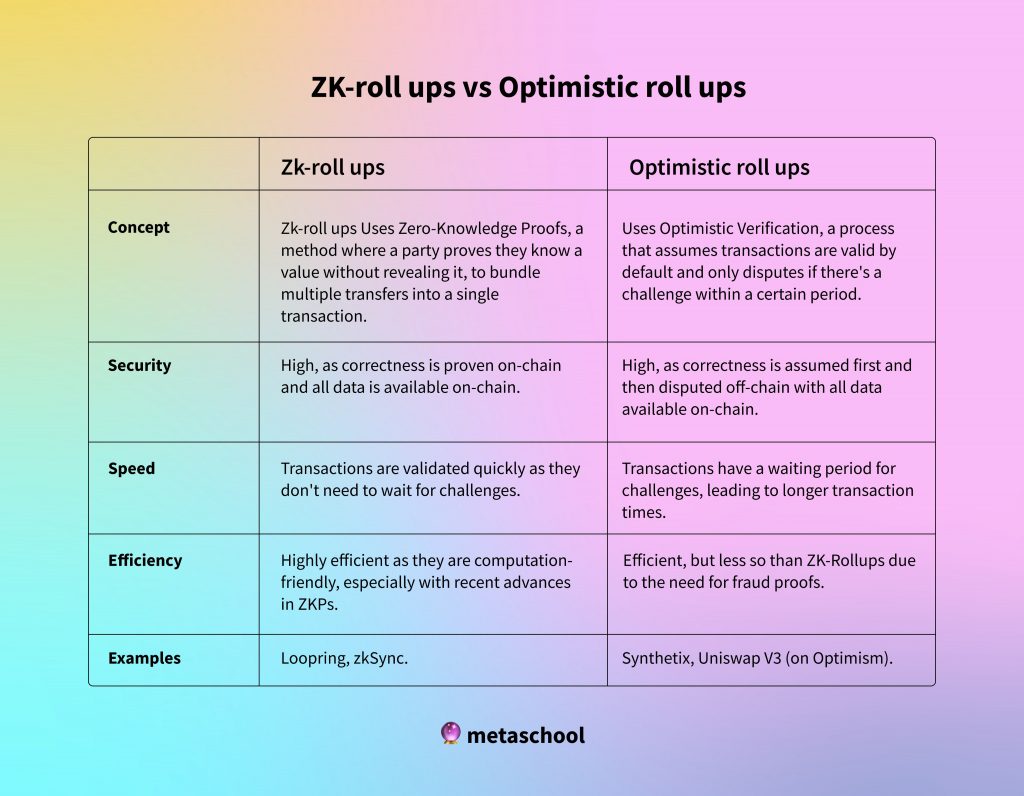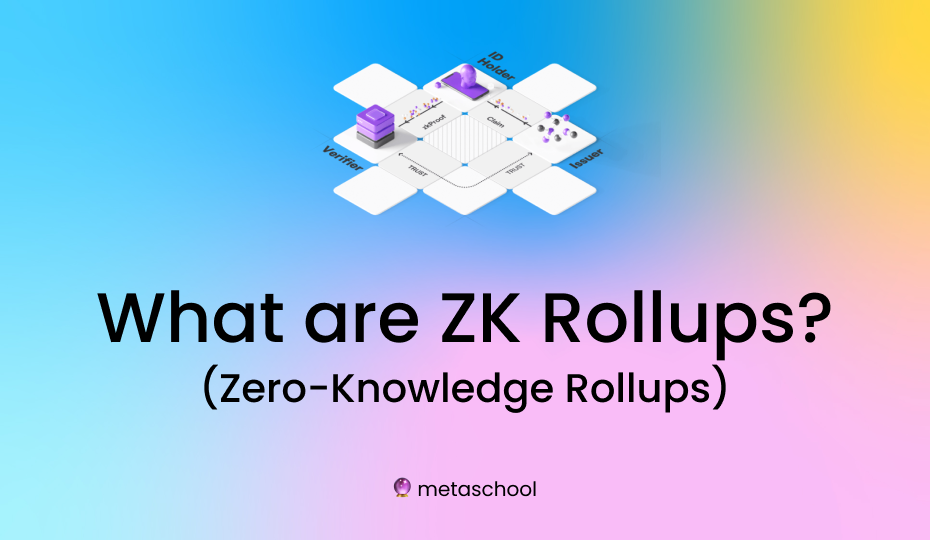Table of Contents
ZK rollups solve the persisting problem of high gas fees and low throughput by empowering users to pay low gas fees and helping blockchains to validate transactions quicker. They deal with gas fees and scalability issues in different ways, and so the zero-knowledge approach is the most effective one of them all.
Introduction to ZK-rollups
A ZK rollup is a Layer-2 blockchain protocol. It performs computation, processes transactions, and stores data off-chain while holding assets in an on-chain smart contract. Just like a rolled paper, ZK rollups execute transactions off-chain and submit them as one transaction onto the Ethereum Blockchain.
Interestingly enough, instead of assuming transactions are valid until proven otherwise. They use validity proofs to instantly prove whether the transactions are valid or not.

Key benefits of ZK rollups
1. Scalability and throughput
Firstly, ZK rollups provide better scalability and higher throughput than traditional on-chain solutions. This is because they use zero-knowledge proofs to combine multiple transactions into a single, larger transaction and execute them off-chain.
This reduces the need for computational resources and network congestion, which can slow down transaction processing and hinder the scalability of the network. As a result, they allow for faster and more efficient transaction processing, helping the network to scale more easily.
2. Security and integrity
Secondly, ZK rollups use zero-knowledge proofs to ensure the security and integrity of transactions. Zero-knowledge proofs are cryptographic techniques that allow one party (the prover) to prove to another party (the verifier) that a statement is true, without revealing any sensitive information.
This is important for maintaining the trustworthiness of the blockchain and protecting against fraud and other malicious activity. By using zero-knowledge proofs, ZK rollups can verify the validity of transactions without revealing any sensitive information, ensuring that the transactions are secure and trustworthy.
3. Efficient and cost-effective
Additionally, they provide a more efficient and cost-effective way to process transactions. By executing transactions off-chain, they reduce the need for computational resources and network congestion, which can slow down transaction processing and increase gas fees.
This allows users to pay lower gas fees and enables the network to validate transactions more quickly and efficiently. And so, by using zero-knowledge proofs to verify the validity of transactions, ZK rollups can reduce the need for on-chain validation, further improving the efficiency and cost-effectiveness of the network.
4. Innovative solution
Finally, ZK rollups are an innovative solution for addressing the scalability challenges faced by many blockchain networks. By using zero-knowledge proofs and executing transactions off-chain, they provide a high level of scalability and throughput while maintaining a high level of security and privacy.
Thus, this innovative approach is likely to be adopted by more and more networks in the future.
How do ZK rollups work?
Time to get technical.
ZK rollups work by using zero-knowledge proofs to aggregate multiple transactions into a single, larger transaction and execute them off-chain. This allows for faster and more efficient transaction processing, while also maintaining a high level of security and privacy.
Key steps in the process
- A user initiates a transaction on the main blockchain, such as Ethereum. This transaction is broadcast to the network and included in a block.
- The operator receives the transaction and includes it in a batch of transactions that will be executed off-chain.
- The operator uses zero-knowledge proofs to verify the validity of the transactions in the batch, without revealing any sensitive information. This ensures that the transactions are secure and trustworthy.
- The operator then executes the transactions off-chain, using a specialized smart contract to hold the assets and track the balances of the participating users.
- Once the transactions have been executed, the operator submits the results of the transaction batch to the main blockchain as a single, larger transaction. This transaction is then validated and included in a block on the main chain, completing the process.
Through this process, ZK rollups provide a more efficient and secure way to process transactions on the blockchain, by executing them off-chain and using zero-knowledge proofs to verify their validity. This allows for faster and more efficient transaction processing, while also maintaining a high level of security and privacy.
Top 10 ZK rollup Projects
ZK rollup projects have gained a lot of attention in recent years due to their ability to significantly improve the scalability and security of blockchains, making them well-suited for a wide range of use cases. Here’s a comprehensive guide on everything you need to know about the top 10 projects in 2023.
1. StarkNet
StarkNet is a layer 2 scaling solution for Ethereum that utilizes ZK rollups and STARK technology to enable fast and cheap transactions on the network. StarkNet has a number of real-world use cases, including the development of decentralized exchanges and payment platforms.
- High scalability: StarkNet is able to process thousands of transactions per second.
- Low transaction fees: Transactions are processed off-chain, reducing mainchain gas fees.
- Secure and transparent: STARKs provide a high level of security and transparency.
2. Loopring
Loopring is a protocol for building decentralized exchanges on Ethereum using ZK rollups to improve scalability and reduce transaction fees. It also supports a wide range of assets and is able to process a high volume of transactions without incurring high main-chain gas fees.
- High scalability: Able to process thousands of transactions per second.
- Low transaction fees: Uses ZK rollups for scalability, reducing main-chain gas fees.
- Wide asset support: Loopring supports a wide range of assets, including tokens, coins, and stablecoins.
3. Zapper
Zapper is a suite of tools for interacting with ZK rollup projects on Ethereum, including a wallet and a dashboard for managing and tracking transactions. Zapper’s wallet supports a wide range of assets and provides users with a simple and user-friendly interface for managing their holdings. The Zapper dashboard provides users with real-time insights into their transactions and the state of their ZK rollup projects.
- Ease of use: Zapper’s wallet and dashboard are designed to be simple and user-friendly.
- Wide asset support: Its wallet supports a wide range of assets, including tokens, coins, and stablecoins.
- Real-time insights: Its dashboard provides users with real-time insights into their transactions and the state of their ZK rollup projects.
4. Arbitrum
Arbitrum is a layer 2 scaling solution for Ethereum that uses ZK rollups to improve the scalability and security of smart contracts. Arbitrum supports a wide range of smart contract languages and is able to process a high volume of transactions without incurring high mainchain gas fees.
- High scalability: Arbitrum is able to process thousands of transactions per second.
- Wide language support: It supports a wide range of smart contract languages, including Solidity, Vyper, and others.
- Low transaction fees: Arbitrum uses ZK rollups for scalability, reducing main-chain gas fees.
5. Matic Network
Matic Network is a layer 2 scaling solution for Ethereum that uses ZK rollups to enable fast, cheap, and secure transactions on the network. Matic Network utilizes a combination of Ethereum and Plasma to ensure the security and transparency of transactions, and is able to process a high volume of transactions without incurring high mainchain gas fees.
- High scalability: Matic Network is able to process thousands of transactions per second.
- Low transaction fees: It processes transactions off-chain, reducing main-chain gas fees.
- Security and transparency: Matic Network utilizes a combination of Ethereum and Plasma to ensure the security and transparency of transactions.
6. StarkDEX
StarkDEX is a decentralized exchange built on the StarkNet layer 2 scaling solution, which utilizes ZK rollups and STARK technology to enable fast and cheap transactions on the Ethereum main-chain. StarkDEX is able to process a high volume of transactions without incurring high main-chain gas fees, making it well-suited for use cases that require fast and cheap trading.
- High scalability: StarkDEX is able to process thousands of transactions per second.
- Low transaction fees: StarkDEX uses StarkNet’s fast and cheap transactions to enable efficient and affordable trading on the Ethereum mainchain.
- Secure and transparent: It utilizes STARK technology to provide a high level of security and transparency.
7. Loopring Pay
Loopring Pay is a payment platform built on the Loopring protocol that enables fast and cheap transactions using ZK rollups. Loopring Pay supports a wide range of assets and is able to process a high volume of transactions without incurring high main-chain gas fees.
- High scalability: Loopring Pay is able to process thousands of transactions per second.
- Low transaction fees: Uses Loopring’s fast and cheap transactions to enable efficient and affordable payments on the Ethereum main-chain.
- Wide asset support: Loopring Pay supports a wide range of assets, including tokens, coins, and stablecoins.
8. ChainGuardian
ChainGuardian is a layer 2 scaling solution for Ethereum that uses ZK rollups to improve the scalability and security of the network. ChainGuardian is able to process a high volume of transactions without incurring high main-chain gas fees, making it well-suited for use cases that require high scalability and low transaction fees.
- High scalability: ChainGuardian is able to process thousands of transactions per second.
- Low transaction fees: ChainGuardian uses ZK-rollups for scalability, reducing main-chain gas fees.
9. Fuel Labs
Fuel Labs is a research and development company focused on building scalable, decentralized applications using ZK rollups and other layer 2 technologies.
- Research and development: Fuel Labs is focused on building scalable, decentralized applications using ZK rollups and other layer 2 technologies.
- Real-world use cases: Fuel Labs has a number of real-world use cases, including the development of decentralized exchanges and payment platforms.
10. Starkware
Starkware is a company that specializes in developing STARK technology, which is used in the StarkNet layer 2 scaling solution to enable fast and cheap transactions on the Ethereum main-chain. Starkware has a number of real-world use cases, including the development of decentralized exchanges and payment platforms.
- STARK technology: Starkware specializes in developing STARK technology, which is used in the StarkNet layer 2 scaling solution to enable fast and cheap transactions on the Ethereum mainchain.
- Real-world use cases: Starkware has a number of real-world use cases, including the development of decentralized exchanges and payment platforms.
—
In conclusion, ZK rollup projects are an important part of the blockchain ecosystem and offer a number of benefits for developers building on these platforms. These projects are able to significantly improve scalability and reduce transaction fees, making them well-suited for use cases that require high throughput and low cost.
Additionally, many ZK rollup projects utilize zero-knowledge proofs to ensure the privacy and security of users’ transactions, making them well-suited for use cases that require privacy. Overall, they are a valuable tool for developers looking to build scalable and secure decentralized applications on a variety of blockchain platforms.
Finally,
ZK rollups are an important and promising solution for addressing the scalability challenges faced by various blockchain networks. By using zero-knowledge proofs and executing transactions off-chain, provide faster and more efficient transaction processing, while also maintaining a high level of security and privacy.
They are an important tool for developers who are looking for ways to improve the scalability and performance of their blockchain applications. Additionally, the use of zero-knowledge proofs and off-chain execution provides many other benefits, such as lower gas fees and reduced strain on the network, making ZK rollups an attractive solution for developers looking to build scalable and secure blockchain applications.
